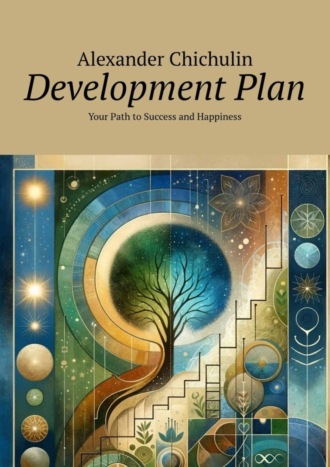
Полная версия
Development plan. Your Path to Success and Happiness
Accepting imperfections: Recognizing that you have areas for improvement is not a sign of weakness, but an indicator of self-awareness and a desire to grow.
Active steps to change: Identify specific actions that will help you improve the identified aspects. It can be anything from everyday small changes to big life decisions.
Track your progress: Document your plan and mark your progress. This will help you see how you are moving forward and keep you motivated.
Ready for continuous learning: See life as an endless learning process. Feedback is not the end, but the beginning of a new stage in your personal growth.
Remember that changes take time and patience. Don’t expect instant results and be kind to yourself throughout the whole process. Being ready for change is your ticket to personal development and a more meaningful and fulfilling life.
_____
And, of course, be prepared for the fact that some revelations may force you to reconsider your relationships with certain people. But don’t worry, most often such conversations only strengthen friendship and mutual understanding. I’m kidding. Probably.
4. Psychometric tests
Psychometric tests are tools that allow you to study and evaluate various aspects of your personality, abilities, and preferences. No, this is not about tests for telepathy or psychic abilities, but about serious psychological tools that can help you better understand yourself.
These tests can be varied:
ü Character and personality tests:
Character and personality tests are valuable tools for better understanding yourself and your place in the world around you. One of the most famous examples is the Myers —Briggs test (MBTI). Let’s take a look at how it can help you with introspection:
What is MBTI: The Myers-Briggs test is a psychological questionnaire designed to determine a person’s psychological preferences in world perception and decision-making. It is based on Carl Jung’s theory of typology and includes 16 different psychological types.
How it works: MBTI evaluates people based on four main criteria: Introversion (I) or Extraversion (E), Sensation (S) or Intuition (N), Thinking (T) or Feeling (F), Judgment (J) or Perception (P). The combination of these criteria determines the psychological type of a person.
Understanding Yourself: MBTI can help you better understand how you interact with the world around you, how you make decisions, and what your communication preferences are. For example, you can find out whether you prefer to work alone or in a team, whether your decisions are based on logic or emotion, and how you organize your life and work.
Using Results: Knowing your MBTI type can be useful in many aspects of life, from career planning to improving personal relationships. This can help you understand why some things come easier to you and others need more work.
As an approach to self-discovery: It is important to understand that MBTI is only one tool for self-discovery, and it does not provide an exhaustive description of your personality. However, it can be a good starting point for further study of your personal qualities and development.
The Myers-Briggs test and similar tools can provide valuable insights about your character and help you better understand how you function as a person. This knowledge can be particularly useful when working on your weaknesses and using your strengths most effectively.
ü Motivation and interest questionnaires:
Motivation and interest questionnaires are tools that help you gain a deeper understanding of what motivates you, what your aspirations and preferences are. These tests can be extremely useful in various aspects of your life, from career development to personal development and hobby selection.
Identifying Motivation: Understanding what motivates you can help you make more informed decisions in both your professional and personal lives. For example, if you find that you are motivated to help others, you might want to consider a career in social work.
Identifying Interests: Knowing your interests will help you choose a hobby or activity that will bring satisfaction and joy. It can also tell you what direction to take in your career or what skills you should develop.
Career Planning: Understanding your motivational factors and interests can provide you with valuable guidance when choosing a career or specialization. If you feel attracted to creative professions, it may be worth exploring career paths in design, art, or writing.
Personal development: These tests can also help you better understand what aspects of your personality and what skills you would benefit from developing. For example, if you find out that you enjoy working with people, you might want to work on your communication skills.
Choosing educational courses and trainings: Being aware of your interests and motivation can help you choose training courses or professional trainings that will be not only useful, but also interesting.
When using motivation and interest questionnaires, it is important to remember that they do not provide definitive answers, but rather serve as a guide and source of self-knowledge. They can open up new horizons for you and help you identify areas in which you should develop.
ü Professional skills and abilities tests:
Professional skills and aptitude tests are an important tool for evaluating your professional competencies and abilities. They can be extremely useful in various aspects of your career, from job search to planning professional development and professional development.
Skills Assessment: These tests help you identify your strengths and areas in which you are particularly competent. This may apply to various areas, such as technical skills, managerial abilities, communication skills, etc.
Identify areas for development: In addition, these tests can point out areas where you have potential for growth and where you should improve your skills. This can be the basis for developing an individual training or professional development plan.
Career Planning: Understanding your professional competencies will help you better navigate your career path or when looking for a new job. You will be able to take a more conscious approach to choosing vacancies and present your strengths to employers.
Improve your professional profile: The results of these tests can be useful for improving your professional profile, for example, when creating a resume or LinkedIn profile. By highlighting your key skills and abilities, you can better attract the attention of potential employers.
Developing Self-Awareness: Understanding your professional strengths and weaknesses is an important aspect of self-awareness that will help you be more productive and successful in your career.
It is important to approach such tests as a tool that provides useful data for your self-development, and not as a final assessment of your abilities. Using these tests in combination with other introspection techniques can give you a comprehensive view of your professional qualities and areas for further growth.
ü Emotional Intelligence:
Emotional intelligence is a key factor for success in many aspects of life, including professional activities and personal relationships. Emotional intelligence tests are designed to assess your ability to understand, interpret, and manage your own emotions and those of others. Here’s how they can be useful:
Understanding Emotions: Emotional intelligence tests help you determine how well you are aware of your own feelings and emotions, as well as those of the people around you. This includes the ability to recognize and name emotions, understand their causes, and influence behavior.
Emotion Management: These tests also assess how effectively you manage your emotions. This can include the ability to calm yourself, control impulsive reactions, overcome stress, and stay calm in difficult situations.
Empathy: An important component of emotional intelligence is empathy, or the ability to understand and feel what other people are going through. Tests can help you assess how well you are able to empathize and understand the point of view of others.
Social interaction skills: Emotional intelligence is closely related to social skills such as communication, persuasion, leadership, and relationship building. Tests will help you evaluate these aspects and identify areas for improvement.
Self-realization and development: Understanding your emotional intelligence can be a powerful tool for personal growth. This knowledge will help you develop a deeper self-understanding and build healthier and more productive relationships.
Emotional intelligence is a skill that can be developed and improved over time. The tests will provide you with a starting point for this process, helping you determine which specific areas of emotional intelligence require your attention and which strategies will be most effective for your development in this area.
_____
It is important to remember that the results of such tests are not the final verdict about your personality or abilities. Rather, they should be seen as hints or tools to better understand yourself. These tests can reveal some hidden aspects of your character or skills that you haven’t noticed before.
It is also important to choose reliable and proven tools, as there are many frivolous and unsubstantiated tests, the results of which can be misleading. Use them as one of the many tools on your journey of self-development and self-discovery.
5. Meditation and mindfulness
Meditation and mindfulness are not just buzzwords, but really powerful tools for deep introspection and understanding your inner world. Often, we are so busy with our daily tasks and worries that we forget to stop and listen to ourselves, to our thoughts and feelings. Meditation and mindfulness practice can be your true helpers along the way.
Let’s see how they can help:
ü Space for thoughts:
In today’s world, where everyday life is filled with hustle and bustle and endless tasks, we rarely manage to find time for silence and solitude. Meditation offers just that-a quiet space for your thoughts, a place where you can detach yourself from the outside world and immerse yourself in your inner world.
Silence as a resource: In the peace and quiet of meditation, you discover the opportunity to be alone with your thoughts. This is a time when you can listen to yourself without being distracted by external stimuli.
Focusing on the breath: One of the main meditation practices is focusing on the breath. This not only helps manage your attention and calms your mind, but also creates an environment where your mind can wander freely, exploring new ideas and perspectives.
Sudden Insights: You will be surprised at how many unexpected thoughts and ideas can come to you during meditation. In silence, your mind is able to generate original solutions to problems that appear complex or confusing on the surface.
Mindfulness and Clarity: Meditation helps you achieve a state of mindfulness where you become more attentive to your thoughts and feelings. This leads to greater clarity in thinking and helps to make meaningful decisions.
Rest for the Mind: In addition to generating new ideas, meditation also gives your mind the necessary rest. In today’s world, where we are constantly overwhelmed with information, such recreation is the key to maintaining mental health and well-being.
By creating a space for meditation in your daily life, you open the door to deeper self-discovery, creative inspiration, and mental peace. It is a simple yet powerful tool that is accessible to everyone and can greatly enrich your life.
ü Introspection:
Mindfulness, or mindfulness practice, offers a unique approach to introspection that can greatly enrich your understanding of your own inner world. This practice will teach you to observe your thoughts and feelings without judgment or criticism, which is the key to deep self-understanding.
Non-evaluative observation: The foundation of mindfulness is the ability to observe your thoughts and feelings without getting caught up in them or judging them as «good» or «bad.» This allows you to view your mental state more objectively.
Understanding internal processes: Regular mindfulness practice helps you understand how your thoughts and feelings work. You begin to notice how individual thoughts and emotions affect your mood and behavior.
Discover Hidden Aspects of your Personality: Through mindfulness, you can discover hidden fears, repressed desires, and unconscious motivations that affect your daily life. This opens up opportunities for their awareness and elaboration.
Developing Emotional Intelligence: Constant introspection and mindfulness contribute to the development of emotional intelligence. You will learn to better understand not only your own emotions, but also the emotions of other people.
Self-acceptance: Mindfulness teaches you to accept yourself as you are, with your strengths and weaknesses. This helps you develop a healthier and more compassionate attitude towards yourself.
Introspection through mindfulness is the path to deeper self-knowledge and self-acceptance. It gives you the tools to understand your inner world, which is a key aspect of personal growth and psychological well-being.
ü Stress Management:
Stress management is an important element in maintaining both mental and physical health. Regular meditation practice has proven to be effective in reducing stress levels, bringing benefits to the mind and body. Here’s how meditation can help you deal with stress:
Reducing physiological stress: Meditation helps reduce the level of cortisol, the stress hormone, in the body. This helps reduce stress-related symptoms, such as high blood pressure, anxiety, or insomnia.
Clarity of thinking: Stress often leads to a «fog in the head» when it is difficult to focus and make decisions. Meditation helps to «clarify» thoughts, improving concentration and clarity of thinking.
Emotional Balance: Regular meditation practice promotes emotional balance by reducing feelings of anxiety and increasing your overall sense of well-being.
Improved sleep: Stress often negatively affects your sleep quality. Meditation can help improve the quality and duration of sleep, which is important for restoring the body and mind.
Awareness and Managing Stress Triggers: Meditation teaches you to be more aware of what is causing stress in your life and develop strategies to manage or minimize it.
Building Resilience to Stress: Regular meditation strengthens your ability to deal with stressful situations, making you more resilient in the future.
You can start practicing meditation with small sessions, gradually increasing the practice time. The main thing is regularity and consistency, which allows you to achieve a long-term effect in managing stress and improving overall health.
ü Increased awareness:
Mindfulness, or mindfulness, is the practice of being fully present and focused in the present moment. This is a way to improve your inner awareness and understanding of the world around you. Here’s how mindfulness can help you increase your level of awareness:
Present here and Now: Mindfulness teaches you to focus on the present moment, avoiding worrying about the future or worrying about the past. This allows you to experience every minute of your life more fully.
Improving concentration: Regular mindfulness practice promotes the ability to concentrate, which is useful in work, school, and everyday life. You’ll learn how to keep your attention focused, which makes your thinking clearer and more focused.
Deep Self-Awareness: Mindfulness practice helps you become aware of your thoughts, feelings, and body sensations without being judged or criticized. It promotes better self-understanding and self-acceptance.
Conscious Interaction with the world around you: Improving Mindfulness allows you to interact more deeply with the environment and people around you. You become more attentive to details and more sensitive to the needs and experiences of others.
Reducing stress and anxiety: Mindfulness practice helps to reduce stress and anxiety levels, as you learn not to react automatically to every thought or feeling, but to perceive them as temporary and changeable states.
Development of emotional stability: Regular use of mindfulness leads to the development of emotional stability. You will learn to better manage emotional outbursts and not let them control your actions.
Mindfulness is the path to a more conscious and balanced life. By practicing mindfulness, you discover the opportunity to live more fully and consciously, finding harmony within yourself and interacting with the outside world.
ü Emotional Intelligence:
Emotional intelligence is the ability to understand, interpret, and manage your own emotions, as well as those of others. This skill plays a critical role in personal success and interpersonal relationships. Practicing meditation and mindfulness is one of the most effective ways to develop emotional intelligence.
Understanding Emotions: Mindfulness meditation and practice help you become more aware of your inner experiences. You will learn to better recognize your emotions, understand their origin and influence on your behavior.
Emotion Management: Regular meditation practice teaches you not to automatically respond to emotional impulses. Instead, you learn to accept them, be aware of them, and let them go calmly, which helps you manage your emotional responses more effectively.
Developing Empathy: Mindfulness promotes empathy by improving your ability to understand and empathize with other people’s emotions. This improves interpersonal communication and helps build deeper relationships.
Improving Interpersonal Skills: As you become more aware of your emotions, you will also improve your interpersonal skills such as communication, conflict resolution, and collaboration.
Acceptance and Self-compassion: Meditation and mindfulness teach you to accept your emotions without self-criticism. This leads to the development of a healthier attitude towards yourself and an increase in self-esteem.
Calm and Balanced: Regularly incorporating meditation into your routine helps you achieve mental calm and emotional balance, which is especially important in stressful and emotionally charged situations.
Developing emotional intelligence through meditation and mindfulness is a process that takes time and practice. However, its results can have a profound impact on your ability to cope with life’s challenges and build healthy relationships, both personally and professionally.
Remember that you can start small – just a few minutes a day. Find a comfortable and peaceful place, sit comfortably, focus on your breathing, and let your thoughts float freely. Over time, you may notice how this has a positive effect on your well-being, on your understanding of yourself and the world around you.
Meditation and mindfulness don’t require any special skills or equipment, just your time, patience, and willingness to listen to yourself. This is your personal path to deep self-knowledge and inner harmony.
_____
So, armed with these tools, you’ll not only get to know yourself better, but you’ll also be able to confidently say, «Yes, I know why I love pineapple pizza so much!» or «That’s why I’m always late!» And remember, introspection is not a one-time event, but an ongoing process. Well, now, go ahead, to the adventure called «I»!
Chapter 2: The Art of Setting Goals: More Than Just Wanting
Goal vs. Fantasy: Fun examples
When we set goals for ourselves, it is important to distinguish them from fantasies. Fantasies are dreams without a plan, while goals are dreams with a specific plan of action. Here are some fun examples to illustrate the difference between a goal and a fantasy:
Becomean Astronautvs. Paper Airplane Flight to Mars
Goal: To Become An Astronaut
«I want to become an astronaut. This is not a simple dream, but a clearly defined goal. To achieve this goal, I will study astrophysics to understand the laws of the universe. In addition, it is important to maintain excellent physical condition – astronauts must be in perfect physical condition. And, of course, I will need to apply and qualify for the space agency. I am ready for many years of study and training, because my goal is to fly into space!»
Fantasy: Flying to Mars on a Paper Airplane
«It would be cool to go to Mars. I imagine this picture: I’m folding a huge paper airplane, strong enough to support my weight. Then I board it like a real spaceship and begin my journey to Mars. While flying through outer space, I dodge asteroids and encounter aliens. This, of course, is just a fun fantasy, but to imagine yourself as the hero of an intergalactic adventure is very exciting!»
These two examples illustrate the difference between a real goal and a fantasy. A goal requires planning, effort, and real action, while fantasy is a game of the imagination that is enjoyable and inspiring, but doesn’t involve real action to achieve it.
Open Your Own vs Restaurant. Treat Michelin-Starred Inspectors With Sandwiches
Goal: To Open Your Own Restaurant
«Opening my own restaurant is my big dream, and I understand that it will take a lot of work and planning to realize it. The first step on this path will be training: I plan to take cooking courses to improve my cooking skills and learn about the intricacies of the restaurant business. Then I will need to create a detailed business plan, including the restaurant concept, menu, marketing strategy, and financial plan. After that, I will start looking for investors or loan funds for start-up capital. I also plan to study aspects of restaurant management to be prepared for entrepreneurial challenges.»
Конец ознакомительного фрагмента.
Текст предоставлен ООО «Литрес».
Прочитайте эту книгу целиком, купив полную легальную версию на Литрес.
Безопасно оплатить книгу можно банковской картой Visa, MasterCard, Maestro, со счета мобильного телефона, с платежного терминала, в салоне МТС или Связной, через PayPal, WebMoney, Яндекс.Деньги, QIWI Кошелек, бонусными картами или другим удобным Вам способом.









